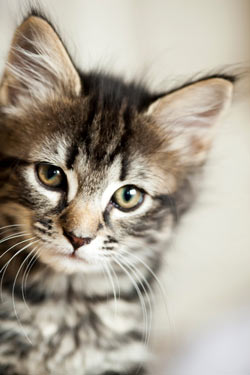Human Medications That Are Dangerous to Cats

According to the Pet Poison Hotline website, close to 50% of the calls they receive regarding toxic ingestions in pets involve human medications (Top 10 Human Medications Poisonous to Pets). This may occur when a cat or kitten scarfs up a dropped pill, gets into the medicine cabinet and helps herself, or is actually given a human medication by a well-meaning owner.
It's important to keep in mind that cats are not humans. Cats' systems are exquisitely sensitive to a wide variety of medications, and they lack the enzymes necessary to effectively break down and eliminate many human drugs from their bodies. Cats are also not small dogs, and some medications that our canine companions can take safely are toxic to our feline friends.
While veterinarians do use some human medications to treat animals, it's important to remember that not all drugs meant to treat people are safe for cats, and even the ones that are may only be safe at extremely controlled doses. Their safety may also be affected by individual patient concerns such as age and concurrent illness.
Even if a medication is not listed in this article, it is best to assume that all human medications are toxic to cats and avoid giving your cat anything without speaking to your veterinarian first.
Below are some of the most common human medications that can result in poisoning in cats:
NSAIDs
Non-steroidal anti-inflammatory drugs, or NSAIDs, are commonly used for many types of pain and sometimes fever-reduction in humans. These medications are also used by veterinarians at times for dogs and cats. However, there specially-formulated drugs specifically for those species, and they are used only with extreme caution at appropriate dosages. NSAIDs that are formulated for humans, such as aspirin, ibuprofen (Motrin, Advil), and naproxen (Aleve) can be extremely dangerous for cats. Giving a cat these drugs can result in ulcers of the stomach and intestines as well as kidney failure.
Tylenol
While not a NSAID, Tylenol (acetaminophen) is used for many of the same functions in humans: pain and fever reduction most commonly. However, acetaminophen is extremely toxic to cats at even low doses, potentially causing liver failure and damage to red blood cells. Veterinarians do not use this drug in cats. You can learn more in this article: "Tylenol Toxicity in Cats." It's important to be aware that acetaminophen is also present in a huge variety of other over-the-counter medications such as Excedrin and many cold remedies.
Prescription, over-the-counter, herbal, canine, and children's medications as well as natural and essential oil-containing products may all be toxic to cats. Check with your veterinarian.
Pseudoephedrine
This medication is used as a decongestant in people and is present in a large number of cold and flu formulations for people. It is over-the-counter, but a person must show identification in order to purchase it, and there is a limit to how much one person can buy in a period of time. Pseudoephedrine causes increased heart rate, agitation, increased blood pressure, and hyperthermia (high body temperature) in cats. A few of the products that contain this medication are Sudafed Congestion, Tylenol Cold, and Theraflu Flu.
Diabetes Medicines
Glipizide and Glyburide, present in pills such as Glucotrol and Micronase that may be taken by people with diabetes, can dangerously lower a cat's blood sugar if ingested, resulting in wobbliness, confusion, seizures, and death.
Antidepressants and Anti-Anxiety Medications
Effexor is a human antidepressant that comes in a capsule. For an unknown reason, cats seem inclined to enjoy eating these. One capsule can be enough to result in severe toxicity in a cat, causing a high heart rate, agitation, aggression, sedation, seizures, and possibly death. Other antidepressants and antianxiety medications can have similar effects in cats.
Statins
These cholesterol-lowering drugs for humans can cause vomiting and diarrhea if a cat ingests them. Some common statins are Lipitor and Zocor.
If you believe your cat has eaten any type of human medication, call your veterinarian or the Pet Poison Hotline at 800-213-6680 immediately.
Blood Pressure Medications
Human medications used to control high blood pressure can cause problems in cats based on the family of drug that is ingested.
- ACE-inhibitors such as Zestril can cause low blood pressure and weakness in cats that eat them, but these effects are generally mild and resolve on their own in a healthy animal.
- Beta-blockers like Tenormin, on the other hand, can cause severe drops in blood pressure and a life-threateningly low heart rate in cats.
Regardless of the type of blood pressure medication ingested, call your veterinarian or the Pet Poison Hotline at 800-213-6680 to determine the best course of action.
Benzodiazepines
This type of medication is used for anxiety reduction in humans. Valium, Klonopin, and Xanax are examples of benzodiazepines used in humans. This type of medication is sometimes used in cats, as well. However, benzodiazepines can cause serious liver failure in some cats, and it isn't always possible to predict which individuals will be affected in this way. You should never give any benzodiazepine to your cat without the direction of your veterinarian.
Birth Control Pills
Birth control pills and hormone replacement therapy medications for human women can be toxic to cats at high enough doses. The estrogen, especially, in these products can result in bone marrow suppression with life-threatening consequences if enough is ingested. If your cat eats any hormone medication, call your veterinarian or the Pet Poison Hotline at 800-213-6680 to find out what you should do. If it is at all possible, have the product packaging available when you call so the amount ingested can be calculated to determine whether your cat has received a potentially toxic dose.
ADD/ADHD Medications
Many medications used to treat ADD and ADHD in people contain strong stimulants such as amphetamines or methylphenidate. These chemicals can cause stimulation of a cat's nervous system with the resultant signs of increased heart rate, breathing rate, and temperature, agitation, seizures, and death. Amphetamines are also present in some medications used for weight loss and narcolepsy in humans. Some of the medications that contain these substances are Ritalin, Adderall, and Dexedrine.
How Can You Protect Your Cat?
Being aware that human medications can have potentially devastating effects when eaten by a cat is the first step in protecting your feline friend. Next, follow these guidelines to provide further safety:
- Always keep all medications in a secure area that your cat can't access.
- Don't keep your medications in secondary containers that are easily tampered with such as plastic baggies.
- When you are taking your medication, use extreme care to ensure that you don't drop any pills or capsules on the floor. Consider making a habit of always opening your bottles while leaning over a sink or counter so it is more obvious to you when you have dropped one.
- When you have visitors, make sure they understand how toxic human medications are to cats. Ask them to keep any medications they have secured at all times.
- Keep your pet's prescribed medications in a different spot from your prescribed and over-the-counter medicines, so it will be less likely for you to mix them up when giving your cat her meds.
- Never, ever give a human medication to your cat without checking with your veterinarian first. Do not rely on the internet or friends or family members who may have used a particular medication in their cat before. Your cat's veterinarian is best suited to determine the risks of a particular medicine to your individual cat.
Works Cited
- Top 10 Human Medications Poisonous to Pets. (n.d.). Retrieved from PetPoisonHelpline.com: www.petpoisonhelpline.com/pet-owners/basics/top-10-human-medications-poisonous-to-pets
You May Also Like These Articles:
Top 10 Cat Toxins of 2014 - Slideshow
Sago Palms Can Be Lethal to Cats
Warning: Topical Medications Containing Flurbiprofen May Be Dangerous to Cats
Easter Lilies: A Holiday Hazard for Cats
Foods Toxic to Cats - Slideshow
Cats and Chocolate: Why is Chocolate Bad for Cats?





